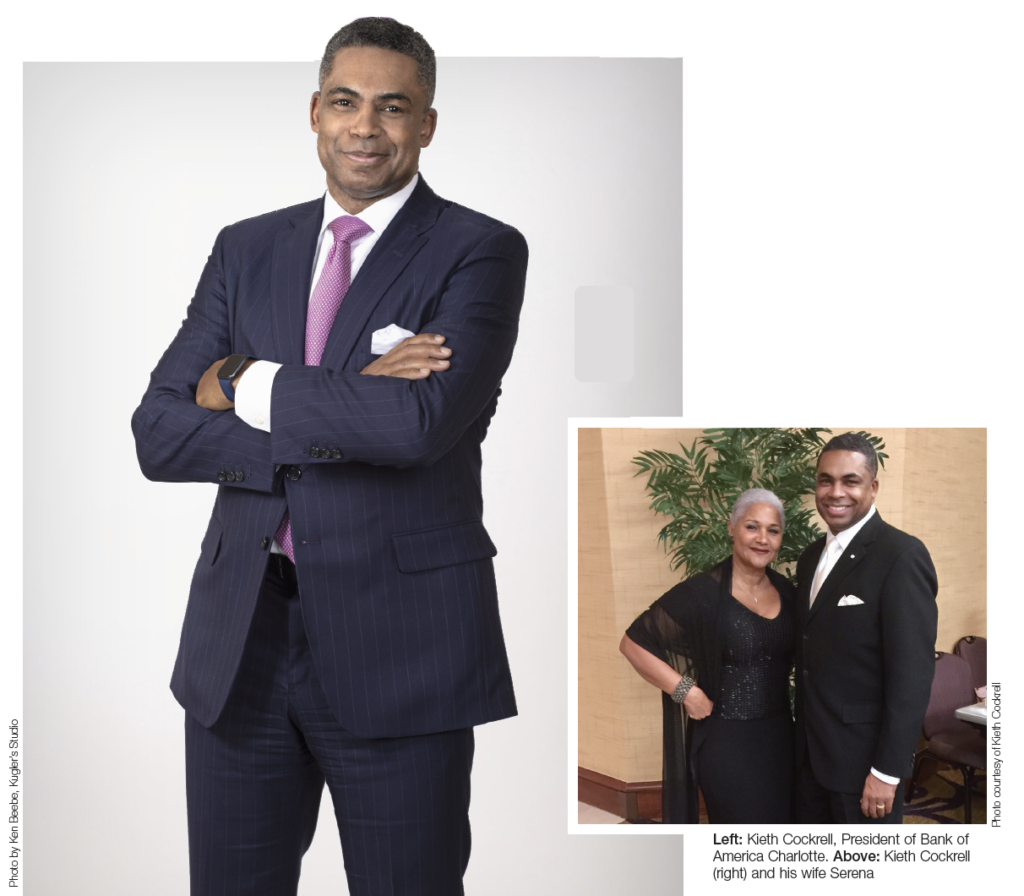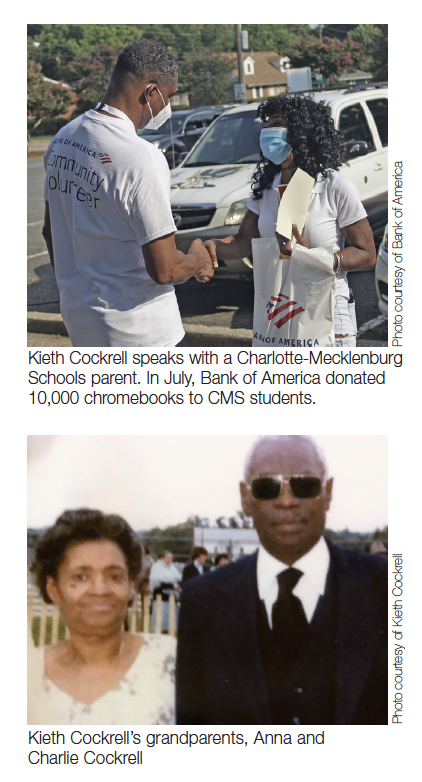By Angela Lindsay
You simply won’t outwork Kieth Cockrell. It’s how he was taught to be from witnessing his grandparents get up every morning and go to labor jobs that they hated. They had to do what was necessary. They were raising Cockrell in the absence of his mother. So, he developed an intense work ethic by watching them. This experience, however, taught him something more. He didn’t just want a job. He wanted a career.
As President of Bank of America Charlotte, Cockrell is responsible for connecting banking and investment resources offered through the banks’ eight lines of business to people and companies across the region — deploying Bank of America’s resources to address social and economic concerns, and helping the local community thrive. Despite an affinity toward mathematics, the financial services industry wasn’t necessarily in Cockrell’s sights. In fact, a high school guidance counselor suggested that he pursue engineering. Next, he focused on applying to colleges.

Cockrell knew nothing of Ivy League schools until they began contacting and expressing an interest in him academically and athletically. Ultimately, he decided to attend Columbia University, a top engineering school at that time, and he was picked to play wide receiver on the football team. Although Columbia was only about 60 miles away from his Long Island home, it seemed a world away from Cockrell’s humble beginnings. His Columbia experience proved to be life changing. It’s where he met his wife; he was classmates with President Barack Obama; and it’s where his path to success would begin.He chose industrial engineering as a major initially because it was “a good mix of business and technical skills,” Cockrell said.
Building a solid career was important to Cockrell. “My grandparents were laborers. They didn’t have careers. They had jobs. They worked in those jobs and committed to those jobs. They went every single day — healthy or ill. Never missed a day. I can remember my grandmother counting down the days to her retirement because she hated that job. That was a powerful influence for me. I wanted a career. I wanted something that I would really enjoy,” he shared.
Summer internships with IBM led to several stints working for the company in various cities across the country, including roles where Bank of America was his client. After the bank’s “tenacious” pursuit of him, Cockrell eventually joined Bank of America. He said the move to leave IBM was a “difficult decision” but acknowledges it was a “tremendous” opportunity and a “relatively easy transition.” Cockrell’s 38-year career in financial services has included key positions such as chief operating officer for consumer and small business, national community markets executive, president of customer service and support, and leading the debit card and ATM businesses, specialty clients’ services.
Being exposed to high performers and “over-achievers” at IBM, helped shape the kind of executive Cockrell wanted to be. He credits the guidance and encouragement from a community of educators, coaches, and business mentors at his back with propelling him along the way from student to C-Suite. In addition, he developed his own simple equation from a lesson he learned throughout his career: P+R=A. That is, performance + relationships = advancement. Having it instilled in him “to work twice as hard,” he already understood the performance variable—but that was only part of the equation.
“It took me a number of years in my career to realize that if I really wanted to continue to deliver top-tier results, it was going to take more than just me,” he said. “When I was early in my career, I knew I didn’t know it all, but you weren’t going to outwork me. I just needed to find the right book, and I’d learn it. I was going to put in the hours not to just do ok, but to make sure my work was damn good.”
It took Cockrell a while to learn that sharing what he knew with other people and, in turn, learning from them, helped him realize how “helpful and valuable” having relationships is. Because people played such an instrumental role in his development, Cockrell understood how important it was to help others succeed.
Extending financial literacy to the community is a way that Cockrell gives back. Cockrell said it’s important for African Americans to understand the importance of credit and to believe that they can own their own home.
“We weren’t born in wealth. We had barriers –– some might say mountains — in front of us. But someone, if not “someones,” in our lives helped us, guided us, believed in us, kicked us in the tail at times. They may not have it in their homes, but they can be exposed to it like I was,” he said.
“Charlotte is just like every other major city. Of course, we’ve got our challenges and opportunities,” he said. But the $10 million pledge the bank made to Johnson C. Smith University, announced last fall in support of the Mayor’s Racial Equity Initiative, “was just a great example of the role that we take very seriously here at Bank of America of being a catalyst for positive change,” Cockrell added.
As far as equity in the workforce, from Cockrell’s perspective, diversity isn’t just a racial or economic opportunity consideration.
“You want diversity of thought,” he said. “You want people who have had a different lived experience, and for us here at Bank of America, I believe we have the audacity to believe that we are THE Bank of America. If you’re going to be THE Bank of America, you have to have perspectives from all of America.” Today, Bank of America has more than 260 Black executives, up from 150. That didn’t happen by accident, Cockrell added, and it’s one of the accomplishments of which he is most proud. But progress is a two-way street.
“People hire and promote people that they know and trust. I fundamentally believe that,” he said, adding that it is a shared responsibility for Black and Brown professionals to put their talents and abilities on display. “One thing you cannot argue — we’re trying; we’re there; we’re out there; we’re not waiting. We may not get it all right, but here in Charlotte we recognize our role and our responsibility,” he says of Bank of America’s diversity and inclusion efforts.
Despite the professional accomplishments and personal accolades he’s earned, Cockrell is clear that his most coveted title is that of “dad.”
“I’m the beneficiary of a tremendous union. Serena, my wife, is the glue,” said the father of three “generous,” “smart” and “bright” children, including an Olympian, an NFL player, and a first-year law school student. Cockrell credits his wife’s decision to retire early and dedicate herself to their family to his ability to accept opportunities at Bank of America that required him to travel out of town frequently. “She made it work because she knows who I desire to be and she knows the essence of who I am,” he added.
“I’m just so thankful to have the opportunity to work for a company like Bank of America that has really tried, at least, to listen to my voice, not only in terms of trying to help the company be better, but also allowing me to be better, allowing me to grow.”

